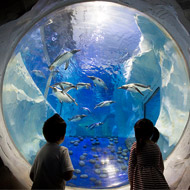
Marine Conservation Society reviewing partnership with aquarium
Conservationists have voiced concern after a BBC investigation found that a total of 4,500 marine animals died at eight Sea Life centres in England in a single year (2015-2016).
The Marine Conservation Society (MCS) said that the findings are a 'cause for concern’ and that ‘discrepancies between individual centres need to be explained’.
According to the BBC, the deaths occurred at centres In Birmingham, Blackpool, Great Yarmouth, Hunstanton, London, Manchester, Scarborough and Weymouth. In Great Yarmouth, there were 812 deaths out of a total of 2,293, equating to around one in every three animals.
MCS Ocean Ambassador Dr Ben Garrod told the BBC: “You wouldn’t go into hospital and expect a one-in-three chance of dying. You wouldn’t expect that in a zoo. I don’t think it is acceptable.”
Sea Life owner Merlin Entertainments told the BBC that different aquariums couldn’t be compared “like for like” because of the diverse range of animals. It explained that some of the losses at its Great Yarmouth Centre were the result of a “technically complex” water issue.
“The response we’ve seen from Sealife reassures us to some degree. In particular, the incidents of high mortality appear to be the result of unforeseen problems which the chain has taken steps to rectify,” said MCS head of programmes Dr Chris Tuckett.
“There are still questions over the keeping of some animals including endangered species and we would like to see a more robust set of record-keeping maintained by public aquariums to demonstrate that they give the specimens in their tanks care and attention as a matter of routine”.
The MCS has collaborated with Sea Life on various conservation projects and accepted sponsorship to produce its Good Fish Guide. In light of the recent findings, Dr Tuckett said that the MCS will be reviewing its partnership with the aquarium if future collaboration is to be pursued.
Image (C) Roy Kilcullen Photography/Gp258/Wikimedia Commons



 The Veterinary Medicines Directorate (VMD) is inviting applications from veterinary students to attend a one-week extramural studies (EMS) placement in July 2026.
The Veterinary Medicines Directorate (VMD) is inviting applications from veterinary students to attend a one-week extramural studies (EMS) placement in July 2026.